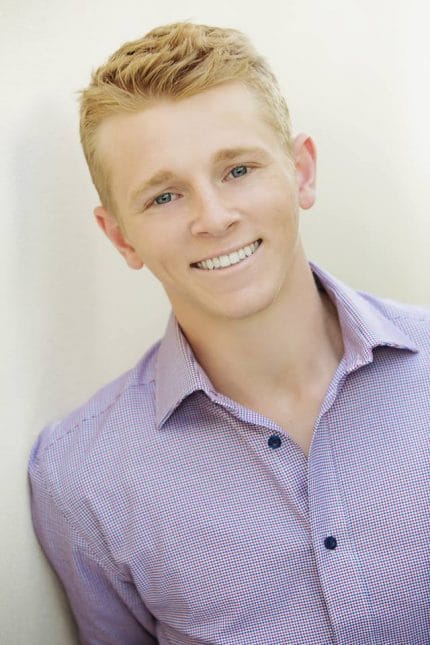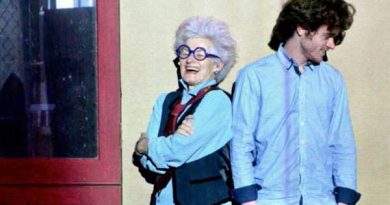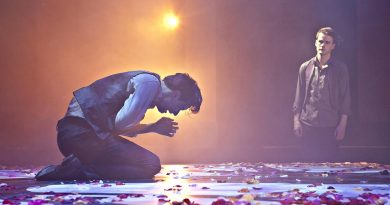Swing Life with The Book of Mormon’s Morgan Palmer
It has only been 18 months since Morgan Palmer graduated WAAPA, but in that time he has landed the exciting and challenging role of ‘swing’ – a member of a company who understudies several ensemble roles – in two major Australian touring shows. I sat down with Morgan, who is currently an offstage swing in the hit musical The Book Of Mormon to chat about the show and all things ‘swing’.

How long have you been in Melbourne with Book of Mormon?
Rehearsals went from early December to about mid January, and then we had our first preview was the 14th of January. We had 3 weeks of previews and our opening night was the 4th of February. Since then it has just been the show, so six months.
And this isn’t your first show, isn’t it?
No, this is my second show. Before Book of Mormon I was contracted in We Will Rock You in 2016.
And were you also a swing in We Will Rock You?
Yes I was! This is my second job being a swing so I feel like I’ve got the reigns a bit better this time round!
What is the audition process like for a swing?
In the audition process it’s essentially the same. When I went in for my auditions there wasn’t swing material, it was just ‘this track’, ‘this song’ and it’s the same process, nothing different.
What is a regular evening for you when you are not on stage?
It depends on how productive I’m feeling that night! (laughs) So on this show I’m an offstage swing, which means I’m not in the show at all, where as in the last show (We Will Rock You) I was an onstage swing. The difference when you’re an offstage swing is you’re not a part of the onstage cast at all, unless you are on for someone’s track where they are ill or injured. An onstage swing is where you are in costume and makeup, however you are onstage in your own plot for the show.
With Book Of Mormon when I’m not on, there’s a range of things I can do. Sometimes I will be going over material to make sure that I am up to scratch, watch the show from the front or hang around backstage to watch quick changes or witness any set moves or spacing. It helps me understand the show better for that particular track and I have a better understanding of it. I’m also just rehearsing things in my dressing room and singing along with the show. Otherwise I can use it for my downtime. I will be practicing piano in the green room, or I practice my German or just hang out with the other offstage casts. Or play Ping-Pong; we have a Ping-Pong table in the green room, which is a lot of fun.
What specific roles do you cover?
The seven tracks that I cover are the seven Mormon ensemble boys.
What is your favourite track?
They’re all so good. That’s the wonderful thing about this show; I don’t think I could pick a favourite. They’re all really different and unique and that’s what makes swinging the show so exciting because every track is so different.
How is the rehearsal process different from being in a role/onstage ensemble track?
As a swing, the rehearsal process is very different. It’s certainly the time where you really require the most focus. From day one you’re already in the rehearsal room and you learn the choreography with everyone, then when they start spacing and running it, you’re obviously not in it so they have a table set up on the side especially for the swings. We have our notepads and our chart paper and draw everything down that they’re spacing. Because you’re not actually in the moment learning your traffic, you have to write it down and witness it. Theory to action can be a very different thing. It’s one thing to write it down, it’s another thing to actually be doing it.
What is the most challenging aspect of being a swing?
Possibly when you’re not on for someone. For me, I love going on, and when you’re not going on for someone there’s the stress of ‘Oh my god is someone going to go off mid show?’ or even just being able to be productive with your time. It’s important to make sure you have a healthy way of maintaining any stress or anxiety you have before going on for a track or that trepidation of not knowing, because it can be a very uncertain job at times when you don’t know when you’re on or off.
Do you have a specific way of handling that stress?
I think I do now. For me, when I go to the theatre I just have to be able to read my energy. Most of the time its fine, but sometimes, if I’m feeling a bit anxious I either play the piano or practice something, you know, preoccupy myself. Once you’ve done all the work, worrying about the job isn’t quite the same as studying for it. You can keep worrying about it but really it’s like ‘OK, I actually know what I’m doing!’ You need to tell your brain to shut up and stop being annoying. Basically, be kind to yourself!
How far in advance do you find out whether you’re on for the show?
The process that we have is by 5:00pm (or three hours before the show) the cast change is posted. Anyone who is injured or unwell calls the stage manager and the stage manager and resident (creative team) will collaborate and decide the cast change and a message will go out.
Do you have any crazy swing stories?
A few weeks ago I had a terrible nosebleed before I went onstage – I’m talking like, explosive – so that was a bit scary because there was a moment where we thought we had to get the other swing to go on for me, even though I was swinging for someone else. It stopped in time, thankfully, but it was a close call.
What is the biggest lesson you’ve learnt since becoming a swing?
I would say it’s the appreciation for the big picture of a show. It only takes one person to be down for things to go wrong, and you have a major musical relying on you to know that little bit of a show and make it work. It’s a really good feeling when you go on and see the audience reactions, knowing they enjoyed the show just as much as any other audience would have enjoyed it, not knowing that there were people on or off. I’ve learnt to appreciate that the theatre is not just for you to perform but it’s actually for you to give to the audience and its about them having the best experience
What is your advice for the future swings out there?
Swinging is very rewarding job and good swings are so valuable. Figure out what ways you can best digest the (shows) information and learn the material. Do whatever notes or charting system helps you process the spacing or blocking of the show.
It sounds like you’ve had an extremely successful and exciting year and a half out of graduating. What would you say to your freshly graduated self?
I would say just keep saying ‘yes’ to things. Just go out there and do it. Don’t hold back, don’t be shy!




